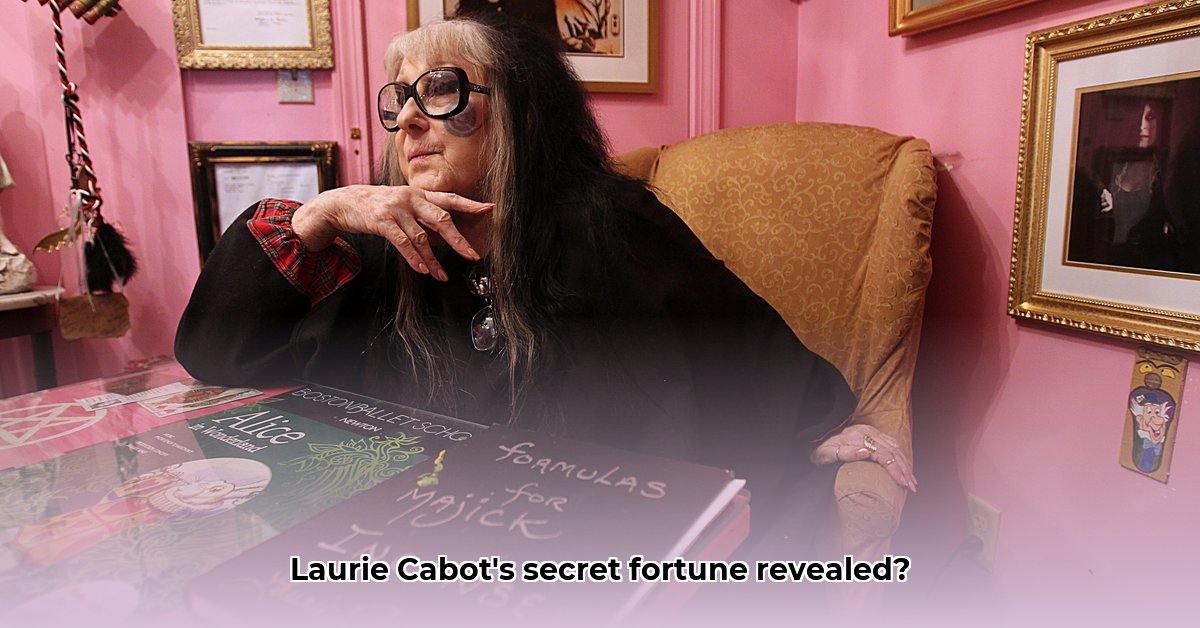
Laurie Cabot Net Worth: A Complex Legacy
Determining Laurie Cabot's precise net worth proves challenging. Unlike publicly traded companies, private individuals' finances aren't readily available. However, analyzing her career and business ventures offers insights into her significant financial success. This isn't merely a financial profile; it's an exploration of the intricate relationship between spirituality, entrepreneurship, and the evolution of Wicca's public image.
The Salem Witch Shoppe and Beyond
Laurie Cabot's entrepreneurial journey began with the Salem Witch Shoppe. More than a retail establishment, it became a landmark, dramatically altering Salem's identity and fueling its tourism boom. The shop's immense popularity, directly linked to Cabot's growing fame, undoubtedly generated substantial revenue. While the exact figures remain undisclosed, the shop's enduring success is undeniable.
Cabot's business acumen extended beyond retail. Her prolific writing, popular workshops, and a later online presence diversified her income streams, further enhancing her financial standing. However, the most intriguing aspect of her story lies in the delicate balance she maintained between her spiritual beliefs and her thriving business empire.
The Ethics of Spiritual Entrepreneurship
Cabot's success raises complex ethical considerations surrounding the commercialization of Wicca. Was her entrepreneurial approach a shrewd exploitation of growing interest in witchcraft, or a genuine extension of her spiritual beliefs? This remains a contentious issue within the Wiccan community.
Some praise Cabot for introducing Wicca to a broader audience, countering centuries of negative stereotypes. Others express concern that her success led to an over-commercialization of Wicca, potentially diluting its spiritual essence. This highlights a crucial question: how does one measure the success of an individual who seamlessly integrated religious practice with business acumen? In Cabot's case, can these two aspects even be separated?
Wicca in the Public Eye: Impact and Controversy
Cabot's influence transcends financial metrics. Her public persona and activism actively challenged negative media portrayals of Wicca, significantly impacting its public perception. Her contributions undeniably increased the visibility and comprehension of Wicca by the broader populace.
This heightened visibility, however, brought unforeseen consequences. The commercialization of Wicca, partially fueled by Cabot's success, attracted not only genuine practitioners but also individuals seeking to exploit the tradition for profit. This raises concerns about cultural appropriation and the misrepresentation of Wicca. Did her actions ultimately benefit or harm the Wiccan community? This question continues to fuel ongoing debate.
A Legacy of Contradictions
Laurie Cabot’s story is a fascinating blend of spiritual devotion and entrepreneurial ambition. Her pivotal role in transforming Salem into a Wicca tourism destination is irrefutable. While the exact figure remains unknown, her business ventures likely generated considerable wealth. Her legacy, however, remains a subject of both admiration and critical analysis within the Wiccan community and beyond. Her story presents a complex interplay of religion, commerce, and cultural impact, constantly prompting new discussions.
Analyzing Laurie Cabot's Financial Success: Key Factors
Although her precise net worth remains unquantifiable, several factors contributed to her substantial financial success:
The Salem Witch Shoppe's Enduring Success: The shop's longevity and unique appeal generated consistent revenue over decades, transforming into a significant profit stream.
Diversification of Income Streams: Her ventures extended beyond retail, encompassing books, workshops, and an online presence, creating a diversified income portfolio that likely cushioned against economic fluctuations.
Branding and Intellectual Property: Cabot effectively built a strong personal brand, leveraging her reputation to market various products and services, maximizing her earning potential.
Tourism Impact on Salem: The increased tourism in Salem, significantly impacted by Cabot’s influence, indirectly boosted her finances, creating a positive feedback loop.
However, challenges remain in determining her net worth due to the private nature of business information, the multiplicity of her income streams, and the impact of economic shifts over time. While a precise figure remains elusive, her entrepreneurial success and lasting impact suggest a significant accumulation of wealth.
How Did Laurie Cabot's Business Practices Impact Wiccan Traditions?
Laurie Cabot's entrepreneurial ventures significantly impacted both Salem's identity and the public's perception of Wicca, but the effect on Wiccan traditions themselves is a subject of ongoing debate.
The Witch Shoppe and the Commercialization of Wicca
The Salem Witch Shoppe, arguably the catalyst for Salem's witchcraft tourism boom, played a crucial role in introducing Wicca to a broader audience. However, this increased accessibility sparked debate. Did Cabot successfully commercialize Wicca, and what are the ethical implications?
Some argue that her commercial endeavors democratized Wicca, making it more accessible. Conversely, critics suggest that this commercialization risked trivializing sacred rituals and beliefs, reducing Wicca to mere spectacle. The core tension lies in balancing increased visibility with the potential dilution of sacred traditions.
Balancing Tradition and Commerce: A Defining Legacy
Cabot herself acknowledged the inherent complexities of her influence. The lines between respectfully engaging with Wiccan traditions and simply exploiting a cultural identity became somewhat blurred. This raises significant questions about the coexistence of commerce and spirituality without compromising authenticity and the ethical responsibilities of entrepreneurs commercializing spiritual traditions.
The Witch Shoppe's commercial success is undeniable. It contributed to Salem's economic revitalization and its identity as a center for modern witchcraft tourism. However, the lasting impact of her business practices on the integrity of Wiccan traditions remains a vital and ongoing discussion.
The Long Shadow of Commercial Success
Cabot's legacy extends beyond financial success; it provides a crucial case study of the complex relationship between religious practice, commerce, and public perception. The ongoing conversation surrounding her impact continues to shape the perception of Wicca and fuels discussions about the ethics of commercializing spirituality and protecting cultural heritage from commodification.